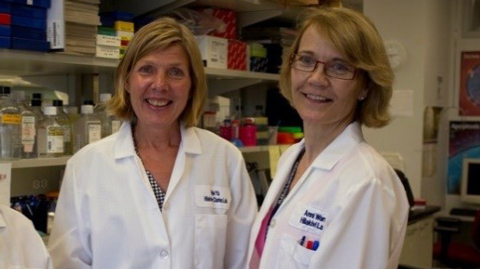Epigenetic Medicine Can Enhance Hormonal Therapies for ER+ Breast Cancer
A Finnish-American research group has discovered a new, significant way to enhance the treatment of estrogen receptor (ER+) breast cancer. By using an animal model, they detected that if epigenetic alterations occurred during offspring's early development due to the mother's high level of estrogen, the impact of hormonal therapies can be enhanced with epigenetic medicine.

The research was mainly conducted at the Georgetown University in the United States. On the left is the leader of the research group Professor of Oncology Leena Hilakivi-Clarke from the Georgetown University, and on the right Docent of Cancer Biology Anni Wärri from the University of Turku.
– At the moment, the treatment of estrogen receptor cancer is difficult as the cancer recurs in approximately half of the patients who are treated with hormonal therapy, such as tamoxifen. Before this study, no one had discovered any genetic or other reasons for developing resistance to the therapies, says Docent of Cancer Biology Anni Wärri from the University of Turku.
The researchers proved that an elevated level of estrogen during pregnancy causes alterations in the epigenetic regulation of the mammary glands of female offspring and increases their chance of contracting breast cancer.
– We also discovered that exposure to estorgen during an offspring's early development doubled the chance of developing resistance to hormonal therapies. By using animal models the research group had developed earlier, we demonstrated that the effect of tamoxifen can be restored with epigenetic drugs and the cancer can be stopped from spreading, says Wärri.
Earlier studies involving tumour cell cultures have shown that epigenetic drugs, such as Histone deacetylase (HDAC) inhibitors and DNA methyltransferase (DNMT) inhibitors, can restore the effect of tamoxifen. In addition, preliminary tests on patients have shown that epigenetic medicine restores the effect of tamoxifen, radiotherapy or chemotherapy on cancer patients who have previously been resistant to the therapies.
– Previously, we did not know what causes these kinds of alterations in the mammary gland and breast cancer. We chose estrogen as our research subject because earlier studies have shown that healthy, pregnant women's estrogen levels can have as large as 19-fold variation during normal, successful pregnancies.
According to Wärri, the study gives hope that significant progress can be made in the treatment of ER+ breast cancer in the near future in cases where the patient's cancer is associated with epigenetic alterations and the epigenetic drugs could be of use.
– The same medicine can prevent breast cancer also on those who have been exposed to high levels of estrogen in utero, states Wärri.
By studying cancer samples, we found four genes where the epigenetic regulation had changed. These genes can be useful markers when screening for alterations in mammary glands and breast cancer.
The research was published online in the esteemed Journal of National Cancer Institute and it will be later published in print as well.
Publication: Effects of In Utero Exposure to Ethinyl Estradiol on Tamoxifen Resistance and Breast Cancer Recurrence in a Preclinical Model.
Authors: Leena Hilakivi-Clarke, Anni Wärri, Kerrie B. Bouker, Xiyuan Zhang, Katherine L. Cook, Lu Jin, Alan Zwart, Nguyen Nguyen, Rong Hu, M. Idalia Cruz, Sonia de Assis, Xiao Wang, Jason Xuan, Yue Wang, Bryan Wehrenberg, Robert Clarke
>> Journal of National Cancer Institute
Text: Anni Wärri, Erja Hyytiäinen
Main image: Markku Saksa
Translation: Mari Ratia